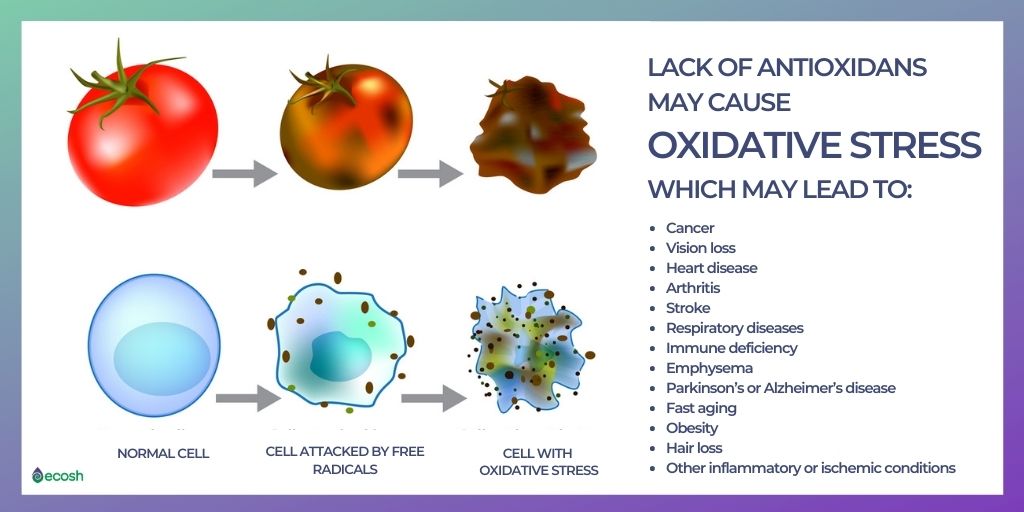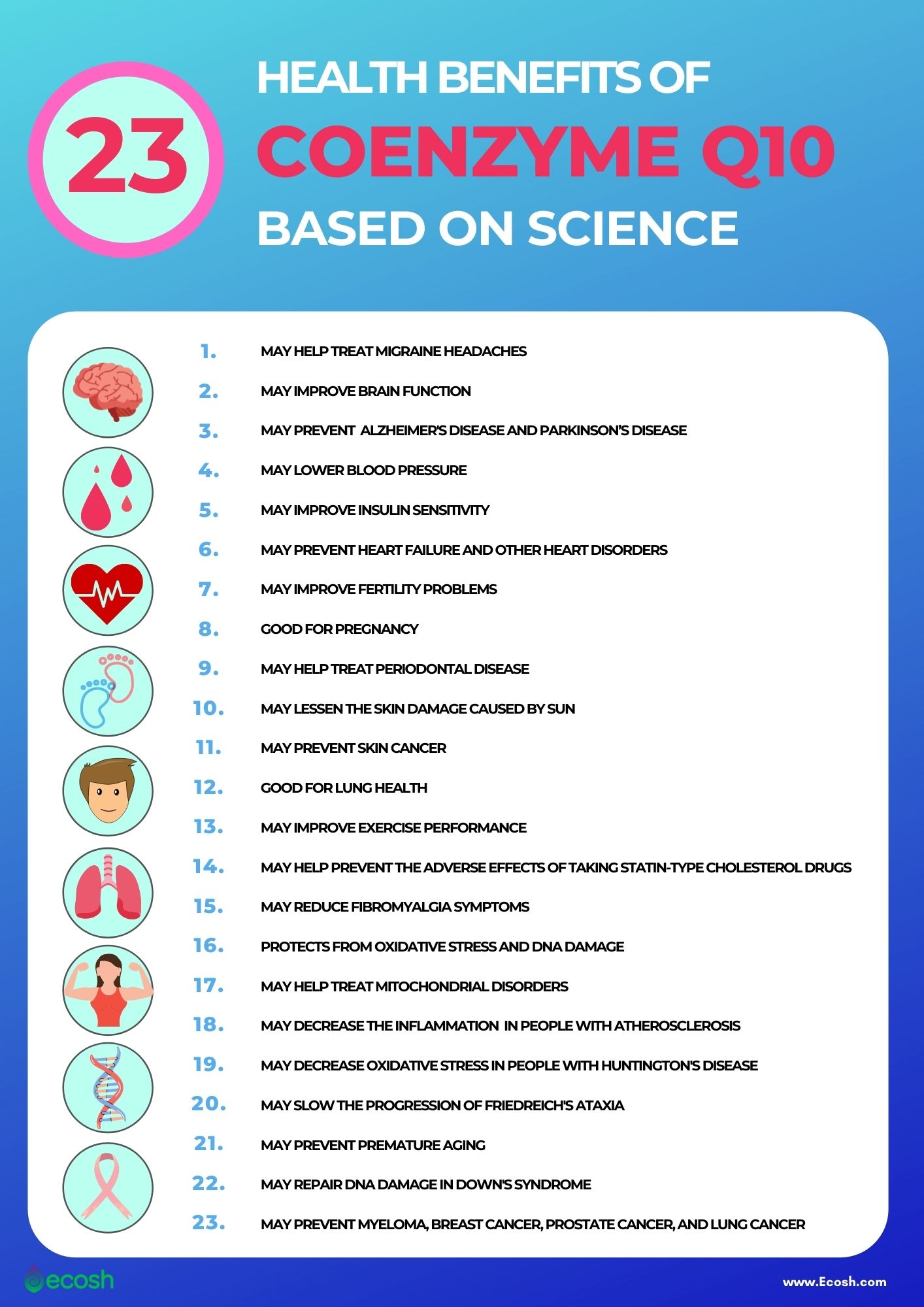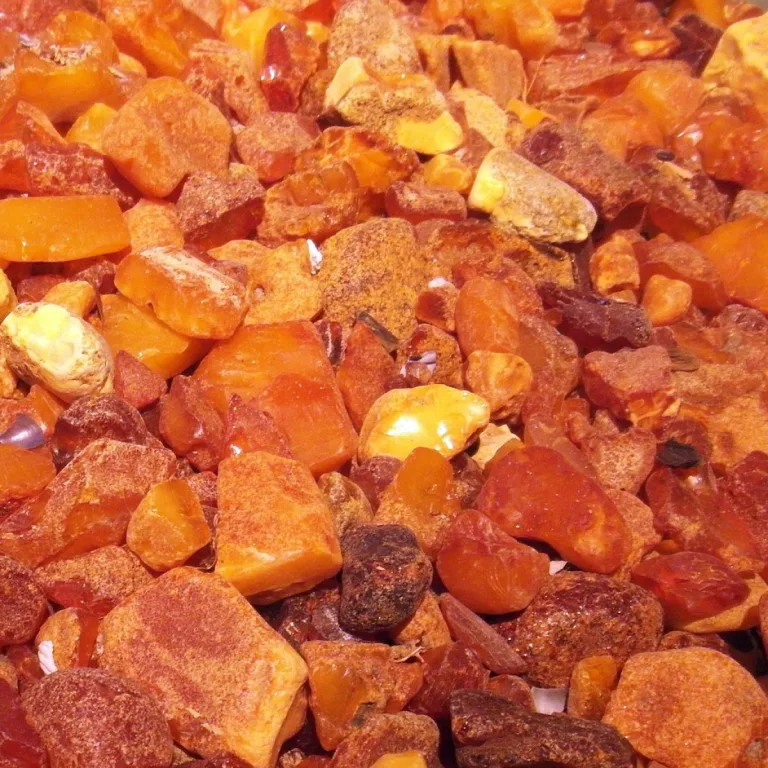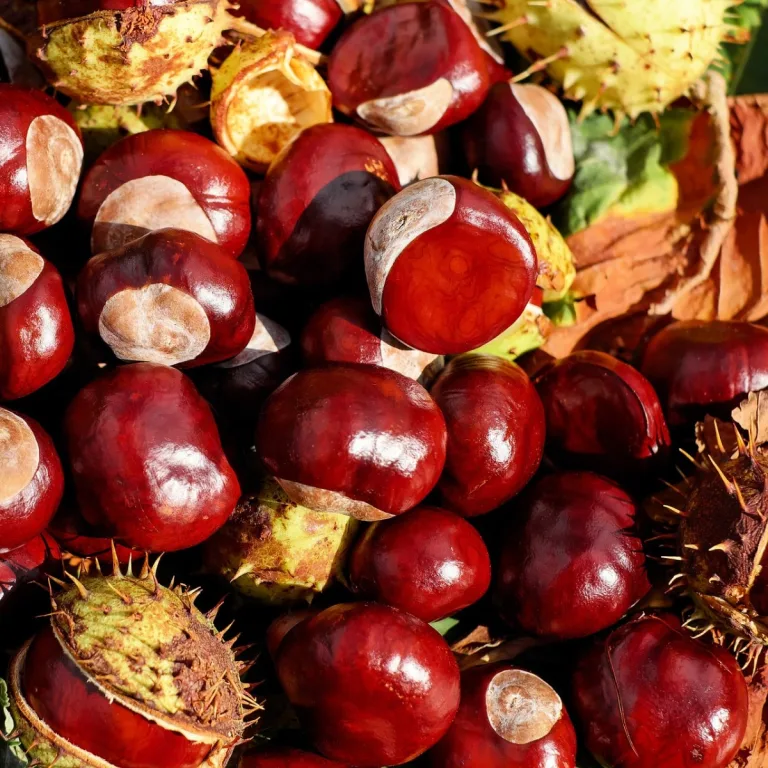Coenzyme Q10 (also known as CoQ10 and ubiquinone) is a compound (yellow to orange crystalline powder) that your body produces naturally and stores it in the mitochondria (the mitochondria are in charge of producing energy) of your cells.
The mitochondria also protect cells from disease-causing bacteria, viruses and oxidative damage. However, when you get older, CoQ10 production tends to decrease. Therefore, older people often seem to develop CoQ10 deficiency.
CoQ10 plays a key role in your health as it acts as an antioxidant, which protects your cells from damage caused by free radicals and plays a vital role in the metabolism. Thus, maintaining normal CoQ10 levels is extremely important. Luckily, you can also obtain CoQ10 from certain foods or supplements.
Plenty of research has shown CoQ10’s broad-spectrum of health benefits. While at the other hand, low levels of CoQ10 have been associated with numerous health conditions such as for example diabetes, brain disorders, heart disease, and even cancer. Although, it’s not yet totally clear whether low levels of CoQ10 cause these diseases or are a result of them.
Here in this article you can read about all you need to know about CoQ10, including CoQ10’s 23 health benefits (1, 3, 26).
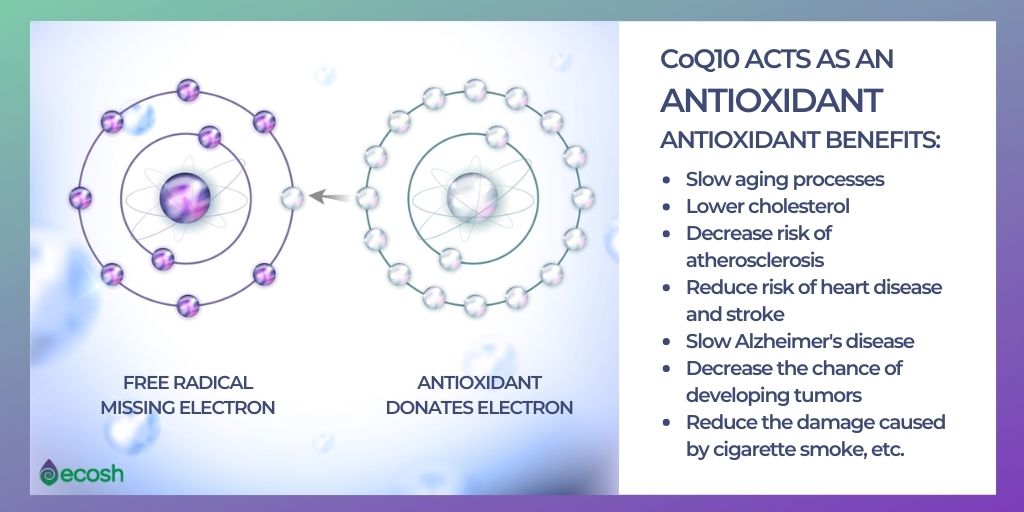
What is Coenzyme Q10 (CoQ10) and Its Main Roles in Your Body?
Ubiquinones or Q-vitamins are a group of fat-soluble compounds with antioxidant activity and a structure close to vitamins. There are various forms of the coenzyme – from Q1 to Q10, but in the human body the coenzyme Q10 dominates. There are about 2-7% of coenzyme Q9 in the human body, which your liver then converts to Q10. However, this is a huge additional expense for the human body in terms of the loss of extra enzymes, vitamins and energy.
Vitamin coenzyme Q10 or Ubiquinone is an enzyme that is actually naturally present in your body and is involved in the process of producing cellular energy (helping to convert food into energy) and protecting mitochondria (a cellular power plant that produces 95% of the energy needed by the human body) from oxidation throughout your life. How?
Namely, CoQ10 plays a key role in the body and acts as an antioxidant in protecting your cells from free radicals. Free radicals damage cell membranes (the cell’s first layer), alter DNA, and may even cause cell death.
Thus, it is believed that free radicals are one of the biggest culprits in causing fast aging and a number of health problems such as heart disease or cancer. Antioxidants can neutralize these free radicals and thereby reduce or even prevent some of the damage they cause.
Other important antioxidants that accelerate the recovery and healing of damaged cells and tissues include vitamins C, A, E, carotenoids, flavonoids, selenium, manganese and zinc.
Due to its antioxidant activity and therapeutic effect, CoQ10 has been studied as a potential treatment for numerous health conditions and diseases described below.
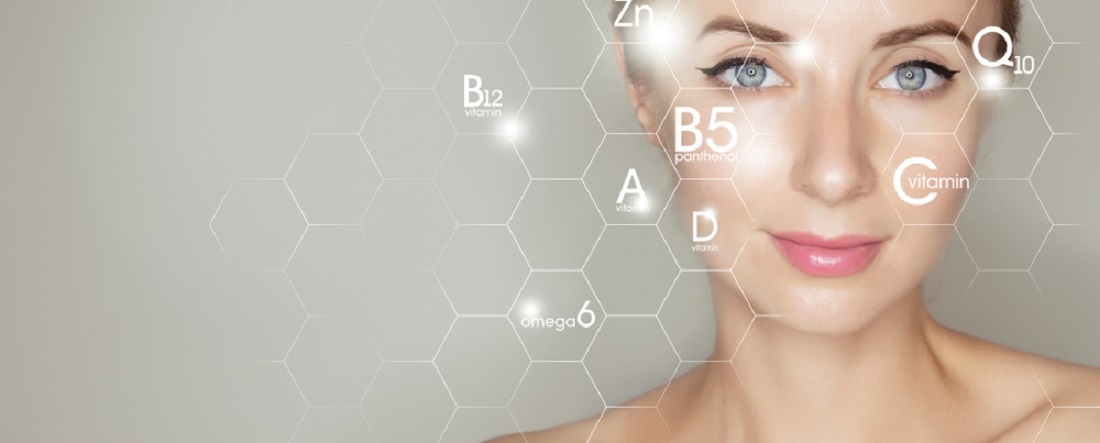
What is The Difference Between CoQ10 Forms Ubiquinone or Ubiquinol and How To Recognize Whether It Is Ubiquinone or Ubiquinol?
Both forms of coenzyme Q10 exist in nature – in the human body, as well as in food. However, most of the coenzyme Q10 we get from food is ubiquinone. In the intestinal wall and liver, ubiquinone will be converted to ubiquinol, which is the active form of coenzyme Q10.
Until recent years, the biggest challenge for dietary supplement manufacturers was to find a technology that would encapsulate the active Q10 while also maintaining its active form. Because ubiquinol is chemically extremely unstable, it returns to the oxidized form as soon as it is exposed to oxygen.
- Ubiquinone – the oxidized inactive form of coenzyme Q10 is characterized by a yellow color.
- Ubiquinol – the active form of coenzyme Q10 is either white or transparent, depending on the temperature. Ubiquinol may be indispensable for the elderly, or for people with certain health conditions, for whom the normal absorption or conversion of Q10 to active Q10 is impossible for some reason.
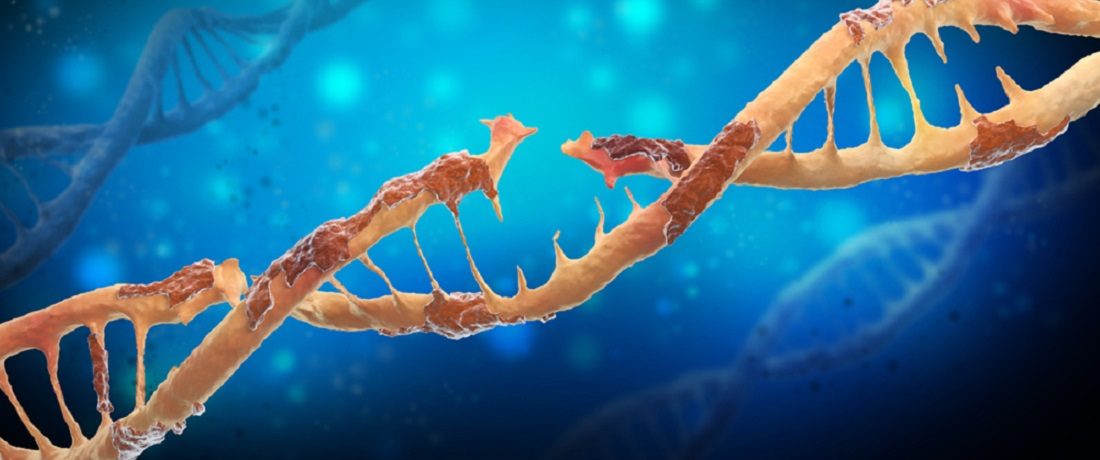
CoQ10 Deficiency Causes and Absorption – What Reduces CoQ10 Absorption and What Increases CoQ10 Absorption?
In your body, CoQ10 is synthesized in the liver when the liver is healthy and there are enough B vitamins. Your liver is able to synthesize Q10 the most between the ages of 19-25. This ability will decrease when you get older.
Inhibited or reduced Q10 synthesis leads to decreased energy production. Muscles get tired faster, heart performance decreases, the efficiency of nerve cells and the production of antibodies by the immune system reduces. This results in fatigue and weakness.
Q10 is mainly stored in your liver and kidneys, but the levels of coenzyme Q10 are highest in myocardium (as myocardial (the muscular tissue of the heart) energy requirements are enormous), doubling the amount of Q10 in levels in liver and kidney.
The two significant aspects that can lead to CoQ10 deficiency are reduced biosynthesis, and escalated use of CoQ10 by the body. Biosynthesis is the major source of CoQ10, and it requires at least 12 genes. But mutations in many of them can cause CoQ10 deficiency.
However, other genetic defects that are not directly related to the CoQ10 biosynthetic process may also affect CoQ10 levels. These include genetic defects such as for example mutations of mitochondrial DNA, ETFDH, APTX, FXN, and BRAF (4).
There are many factors that can prevent CoQ10 formation and absorption, such as:
- Constant stress, because under stress, digestion basically almost stops because the blood that transports nutrients to cells, tissues, and organs travels to the so-called “escape and fight situation” muscles.
- Vitamin B6 deficiency.
- Intestinal disorders (including intestinal malformations).
- Persistent iron overload (including iron tablets).
- Genetic defects in CoQ10 synthesis or utilization.
- Risen demands by tissues as a result of disease.
- Mitochondrial diseases.
- Oxidative stress (because of aging).
- Rancid oils and fats.
- Even water with too much chlorine.
- Side effects of various medications such as for instance:
- Statins (widely used to lower cholesterol)
- Antibiotics
- Laxative mineral oils
- Birth control pills (6).
What is Primary CoQ10 Deficiency and What May Happen When You Don’t Get Enough CoQ10?
Primary CoQ10 deficiency is a rare, clinically heterogeneous autosomal recessive disorder, that involves shortage (deficiency) of coenzyme Q10, and can influence numerous parts of the body, mainly the brain, kidneys and muscles.
This disorder is caused by mutation in any of the genes encoding proteins directly involved in the synthesis of coenzyme Q10, and is unique among mitochondrial disorders as early supplementation with CoQ10 can prevent the onset of renal and neurological manifestations. The signs and symptoms, severity and age of onset of primary coenzyme Q10 deficiency may vary widely.
In the most serious cases, the disorder emerges in infancy and leads to problems that can be life-threatening. These health issues include:
- Severe brain dysfunction combined with muscle weakness (encephalomyopathy).
- The failure of other body systems.
The modest cases of primary CoQ10 deficiency can start as late as a person’s sixties and may often cause neurological and other problems that gradually get worse unless treated with coenzyme Q10 supplementation. These health problems include:
- Coordination and balance issues (cerebellar ataxia) caused by defects in the part of the brain that is involved in coordinating movement (cerebellum).
- Seizures.
- Poor muscle tone (hypotonia).
- Involuntary muscle contractions (dystonia).
- Progressive muscle stiffness (spasticity).
- Intellectual disability.
- Abnormal eye movements (nystagmus).
- Loss of vision because of the atrophy (degeneration) of the optic nerves or breakdown of the light-sensing tissue at the back of the eyes (retinopathy).
- Sensorineural hearing loss because of abnormalities in the inner ear.
- Nephrotic syndrome (a type of kidney dysfunction), which happens when damage to the kidneys impairs their function, which allows protein from the blood to pass into the urine (proteinuria). It can occur with or without neurological abnormalities.
- Increased cholesterol in the blood (hypercholesterolemia).
- Unusual buildup of fluid in the abdominal cavity.
- Swelling (edema).
- Blood in the urine (hematuria), which can lead to a decreased number of red blood cells in the body (anemia).
- Unusual blood clotting, or reduced number of specific white blood cells which can lead to a weaker immune system and frequent infections in individuals with nephrotic syndrome. Without cure (which is taking CoQ10 supplements), people may finally develop irreversible kidney failure (end-stage renal disease).
- Hypertrophic cardiomyopathy (a type of heart disease that enlarges and weakens the heart muscle) (5, 7, 8, 25).
23 Possible Health Benefits of Coenzyme Q10 (CoQ10) Based on Science – Why Do People Take CoQ10?
Generally, most healthy people should have enough CoQ10 naturally. However, some evidence suggests that adding more (in the form of CoQ10 supplements) may be beneficial. This is because some medical conditions (such as many neurodegenerative disorders, cancer, diabetes, and cardiovascular and muscular diseases) as well as older age may lead to decreased levels of CoQ10.
Luckily, the treatment with CoQ10 does not cause serious adverse outcomes in humans and new formulations increase CoQ10 absorption and tissue distribution.
Although some of the research has not found any conclusive benefits, taking CoQ10 orally may provide many significant health benefits and has been frequently used as an antioxidant strategy in many different diseases listed below.
1. Coenzyme Q10 For Hypertension (High Blood Pressure)
According to studies CoQ10 dietary supplements may lower blood pressure slightly (1, 3).
2. Coenzyme Q10 For Heart Failure and Other Heart Conditions
It seems that when combined with regular medications CoQ10 may also lessen future cardiac risks, help treat heart failure and other heart conditions by lessening oxidative damage, improving heart function, and increasing ATP production. However, the evidence is conflicting (1, 3, 8).
3. Coenzyme Q10 For Fertility Problems Such as Low Sperm Count in Men and The Number of Eggs in Women
According to studies, the antioxidant properties of CoQ10 may help better sperm quality and lessen the decrease in age-related decline in quality and number of eggs in women (3, 6, 9).
4. Coenzyme Q10 For Pregnancy
Taking CoQ10 supplements is linked to reduced the risk of developing pre-eclampsia (a pregnancy complication described by high blood pressure and signs of damage to another organ system, most frequently the liver and kidneys) in women at risk. Even more, fetal wasting with subsequent spontaneous abortion has also been associated with low levels of CoQ10 (3).
5. Coenzyme Q10 For Periodontal Disease
Periodontal disease is an inflammatory disease process which is mainly the result of a bacterial attack and inflammation of the gums and the bone that surround the teeth. Fortunately, coenzyme Q10 serves as an endogenous antioxidant which raises the concentration of CoQ10 in the diseased gingiva and efficiently suppresses advanced periodontal inflammation (3).
6. Coenzyme Q10 For Diabetes
According to studies, CoQ10 may improve insulin sensitivity and adjusts type 2 diabetic disorder (3, 13).
7. Coenzyme Q10 To Protect Sun Damage To Skin
Environmental factors, such as UV rays can lead to reduced protection from harmful external aggressors, lessened skin moisture, and the thinning of the layers of the skin. However, applying CoQ10 directly to the skin may lessen the damage caused by external factors such as sun damage, and increase energy production in skin cells as well as promote antioxidant protection.
8. Coenzyme Q10 For Oxidative Stress
CoQ10 guards your cells against oxidative damage and stimulates cellular energy production, therefore promoting their health and survival.
9. Coenzyme Q10 For Skin Cancer
Individuals with low levels of CoQ10 seem to have a higher risk of developing skin cancer (6, 10).
10. Coenzyme Q10 For Breast Cancer, Prostate Cancer, Lung Cancer and Myeloma
According to studies, people with cancer have decreased levels of CoQ10. Therefore, low levels of CoQ10 have been linked with higher risk of cancer (14, 15, 16, 17).
11. Coenzyme Q10 For Exercise Performance
Oxidative stress can have an impact on muscle function, and therefore, exercise performance. Fortunately, administering CoQ10 supplements may help in exercise performance by reducing oxidative stress in the cells and improving mitochondrial functions (6, 12).
12. Coenzyme Q10 For Brain Function
Sadly, also the brain is very likely to be harmed by oxidative damage which increases the production of harmful compounds that may affect cognition, memory and physical functions. However, according to studies, coenzyme Q10 has been shown to lessen the activity of harmful compounds that can cause brain diseases, and defend your brain cells from oxidative damage (6).
13. Coenzyme Q10 For Alzheimer’s Disease and Parkinson’s Disease
Even more, according to some preliminary studies, as CoQ10 may reduce these harmful compounds leading to oxidative damage, and to brain diseases, it may also slow down (but not stop) the progression of Alzheimer’s disease and Parkinson’s disease. However, more research is needed to confirm this effect (1, 6, 18, 19, 20).
14. Coenzyme Q10 For The Adverse Effects, Such as Liver Problems and Muscle Pains of Taking Statin-type Cholesterol Drugs
CoQ10 has been shown to be necessary if your doctor has prescribed cholesterol-lowering statins (such as atorvastatin, cerivastatin, lovastatin, pravastatin, simvastatin), because these medicines do not allow the liver to synthesize Q10. Statins reduce the liver’s ability to synthesize Q10 by about 40% over the years and cannot be compensated for by eating CoQ10 rich foods.
According to some preliminary evidence, CoQ10 may also help to prevent or treat the adverse effects, such as liver problems and muscle pains, of taking statin-type cholesterol drugs. Though, more research is needed. Note that externally added Q10 does not reduce the body’s own Q10 production in any way (1, 3).
15. Coenzyme Q10 For Migraine Headaches
Taking CoQ10 seems to help in the prevention and treatment of migraines, because it boosts mitochondrial function and lessens inflammation. However, it may take several months until it works (3, 11).
16. Coenzyme Q10 For Lung Health
Also lungs are extremely susceptible to oxidative damage. Therefore, the lack of antioxidant protection, including low levels of CoQ10 and increased oxidative damage in the lungs, may lead to lung diseases such as asthma and chronic obstructive pulmonary disease (COPD). In people with asthma, supplementing with CoQ10, may reduce inflammation, as well as the need for steroid medications to treat it (6, 21, 22, 23, 24).
17. Coenzyme Q10 For Mitochondrial Disorders
People with mitochondrial myopathy have often reduced levels of CoQ10 in their muscle tissue. Therefore, CoQ10 is extremely widely used for the treatment of primary mitochondrial disorders. However, the clinical evidence is limited due to the relative rarity and heterogeneity of mitochondrial diseases (3).
18. Coenzyme Q10 For Fibromyalgia
According to recent studies, oxidative stress and reduced levels of CoQ10 is linked to clinical symptoms in fibromyalgia. In one study, fibromyalgia patients with CoQ10 deficiency showed a significant reduction in symptoms after CoQ10 treatment. Therefore, determining CoQ10 deficiency and following supplementation may result in significant clinical improvement in fibromyalgia (3).
19. Coenzyme Q10 For Atherosclerosis
Evidence demonstrates that supplementing CoQ10 at a dose of 150 mg/day can lessen oxidative stress, increase antioxidant enzyme activity and decrease the inflammatory marker in people with atherosclerosis. It may also possess a direct anti-atherogenic effect (3).
20. Coenzyme Q10 For Huntington’s Disease
Huntington’s disease (HD) is a neurodegenerative genetic condition that results in progressive death of striatal neurons, with clinical symptoms of dementia, chorea, and dramatic weight loss. But as there is strong evidence that early oxidative stress may play a role in Huntington’s disease, a strategy of using CoQ10 has been proposed. CoQ10 treatment has shown promising results in decreasing markers of oxidative stress in people with Huntington’s disease (3).
21. Coenzyme Q10 For Friedreich’s Ataxia
Evidence indicates that oxidative damage, mitochondrial respiratory chain dysfunction and iron accumulation play a significant role in Friedreich’s ataxia. However, according to a long lasting open-label pilot trial, which lasted 47 months – a sustained improvement in mitochondrial energy synthesis was observed that was associated with a decline of disease progression and improved cardiac function. Sadly, in shorter studies the results were less satisfactory (3).
22. Coenzyme Q10 For Down’s Syndrome
Down’s syndrome (DS) is a chromosomal abnormality linked with a complex phenotype. Interestingly oxidative stress is known to play a major role also in this pathology, suggesting that oxidative stress contributes to the clinical manifestation of Down’s syndrome. The results of studies that investigated the effect of CoQ10 treatment on DNA damage in Down’s syndrome, suggest that the effect of CoQ10 treatment in Down’s syndrome not only reflects antioxidant efficacy, but likely also modulates DNA repair mechanisms (3).
23. Coenzyme Q10 For Aging
Decreased coenzyme Q10 amounts due to aging may be one of the main factors in the development of chronic health disorders in old people. Even more, in addition to being an antioxidant, CoQ10 is also involved in cellular processes. Therefore, proper uptake of CoQ10 into cells is critical for the improvement of cell activity during aging. Maintaining CoQ10 functional levels at cell membranes either by improving endogenous synthesis or by dietary supplementation can be a key strategy to boost health during aging (3).
When Could You Start Taking Coenzyme Q10?
- In case of lasting physical and mental exertion, including in case of constant stress and exhaustion
- For long-term use of drugs
- As you age
- In the absence of B vitamins
- In case you suspect you are exposed to too much free radicals
- Some diseases such as cardiomyopathy, high cholesterol, and health conditions described above
- Recovery from various diseases
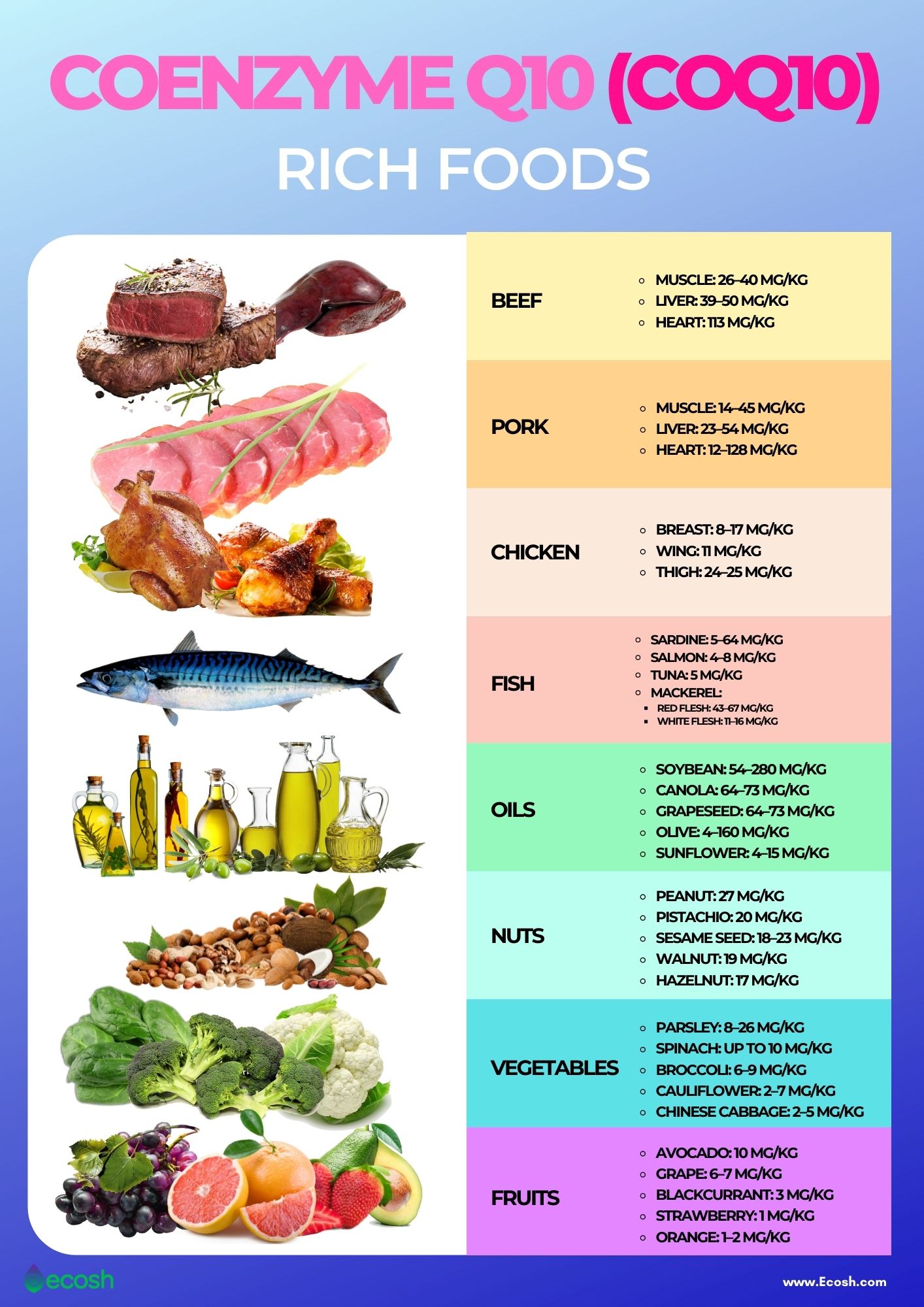
Foods Rich in CoQ10 – Can You Get CoQ10 Naturally From Foods?
CoQ10 amounts found naturally in certain foods is much lower than that found in dietary supplements. Meat, poultry and vegetable oils are the richest sources of dietaryCoQ10. While vegetables, and fruits contain very modest amounts of CoQ10, except avocados, which have quite high CoQ10 content.
CoQ10 Content in Selected Foods:
- Pork:
- Muscle: 14–45 mg/kg
- Liver: 23–54 mg/kg
- Heart: 12–128 mg/kg
- Beef:
- Muscle: 26–40 mg/kg
- Liver: 39–50 mg/kg
- Heart: 113 mg/kg
- Chicken:
- Breast: 8–17 mg/kg
- Wing: 11 mg/kg
- Thigh: 24–25 mg/kg
- Fish:
- Sardine: 5–64 mg/kg
- Salmon: 4–8 mg/kg
- Tuna: 5 mg/kg
- Mackerel:
- Red flesh: 43–67 mg/kg
- White flesh: 11–16 mg/kg
- Oils:
- Soybean: 54–280 mg/kg
- Canola: 64–73 mg/kg
- Grapeseed: 64–73 mg/kg
- Olive: 4–160 mg/kg
- Sunflower: 4–15 mg/kg
- Nuts:
- Peanut: 27 mg/kg
- Pistachio: 20 mg/kg
- Sesame seed: 18–23 mg/kg
- Walnut: 19 mg/kg
- Hazelnut: 17 mg/kg
- Almond: 5–14 mg/kg
- Vegetables:
- Parsley: 8–26 mg/kg
- Spinach: up to 10 mg/kg
- Broccoli: 6–9 mg/kg
- Cauliflower: 2–7 mg/kg
- Chinese cabbage: 2–5 mg/kg
- Fruits:
- Avocado: 10 mg/kg
- Grape: 6–7 mg/kg
- Blackcurrant: 3 mg/kg
- Strawberry: 1 mg/kg
- Orange: 1–2 mg/kg
- Grapefruit: 1 mg/kg
- Apple: 1 mg/kg
- Banana: 1 mg/kg (4).
CoQ10 Recommended Dosages – How Much CoQ10 Enzyme Should You Take?
Starting from the age of 25, Q10 synthesis in your body begins to decrease. At the age of 60, your body produces only 40% of the amount your body actually needs. However, if the daily amount of Q10 drops to 25%, pathological processes, such as disorders of the heart, liver and lungs, may begin to develop.
Important facts about CoQ10 intake:
- Although there is no established ideal amount of CoQ10, the typical recommended daily dosage of coenzyme Q10 from food and other sources is considered to be 90 mg-200 mg. This dosage however, may vary depending on personal needs and health conditions. But, with food, people usually get only 10-20 mg of Q10 while they should get at least 30-70 mg.
- In therapeutic purposes, researchers have used doses of CoQ10 ranging from 50 mg to 1,200 mg in adults, occasionally split into several doses during a day.
- The effect of coenzyme Q10 begins to appear after 2-4 weeks of consumption until the required levels are reached.
- The simultaneous intake of fat-containing (lipids) products and foods promotes the absorption of vitamin Q10.
- Cooking (frying) reduces CoQ10 content in food by 14–32%.
- Note that different supplements might have non-identical strengths and ingredients, therefore you should follow the instructions on the label or get advice from your dietician or doctor (1, 2, 3, 4).

CoQ10 Cautions and Overdose Complications
- AS CoQ10 may lower blood pressure and blood sugar levels, individuals with chronic diseases such as diabetes, heart failure, kidney or liver problems, should be cautious of using CoQ10 supplements and consult their doctor.
- Also individuals taking certain medications such as thyroid medications or blood thinners as well as chemotherapy should consult with their doctors before consuming CoQ10 supplements.
- Due to the little evidence about its safety to all populations, children or for women who are pregnant or breastfeeding should not consume CoQ10 supplements without consulting a therapist.
- Constant and extremely excess intake of CoQ10 (the observed safe level (OSL) risk assessment method indicated that the evidence of safety is strong at intakes up to 1200 mg/day, and this level is identified as the OSL) may in rare cases lead to mostly gastrointestinal adverse effects such as:
However, these side effects usually disappear within a week after stopping the excess intake (1, 4).
NB! The information provided here is for informational purposes only, so do not consider it as health care or medical diagnosis and treatment. Do not consider this information as a guarantee of the results you want to achieve. In addition, do not consider this information as a replacement for the advice of your physician or other healthcare professional.
Even more, you should not use it to diagnose or treat a health problem. Before changing or discontinuing your existing medication, treatment, or care, or taking any dietary supplements, be sure to consult with your healthcare professional or doctor before starting any diet or program, or if you suspect you may have a medical condition.
Written by Maria-Helena Loik
Pictures: Pexels.com, Pixabay.com, Shutterstock.com
Sources:
- CoQ10 (Coenzyme Q10): Health Benefits, Dosage, & Side Effects (webmd.com)
- CoQ10 Dosage: How Much Should You Take per Day? (healthline.com)
- Coenzyme Q10 Therapy (nih.gov)
- Coenzyme Q10 – Wikipedia
- Primary Coenzyme Q10 Deficiency – GeneReviews® – NCBI Bookshelf (nih.gov)
- 9 Benefits of Coenzyme Q10 (CoQ10) (healthline.com)
- Primary coenzyme Q10 deficiency: MedlinePlus
- Coenzyme Q10 for the treatment of heart failure: a review of the literature – PubMed (nih.gov)
- Antioxidant supplements and semen parameters: An evidence based review – PubMed (nih.gov)
- Low plasma coenzyme Q10 levels as an independent prognostic factor for melanoma progression – PubMed (nih.gov)
- Oral coenzyme Q10 supplementation in patients with migraine: Effects on clinical features and inflammatory markers – PubMed (nih.gov)
- Oxidative stress and antioxidant defense in plasma after repeated bouts of supramaximal exercise: the effect of coenzyme Q10 – PubMed (nih.gov)
- Novel CoQ10 antidiabetic mechanisms underlie its positive effect – PubMed (nih.gov)
- Low plasma coenzyme Q(10) levels and breast cancer risk – PubMed (nih.gov)
- Activities of vitamin Q10 in animal models and a serious deficiency in patients with cancer – PubMed (nih.gov)
- Plasma coenzyme Q10 levels and prostate cancer risk – PubMed (nih.gov)
- Lipid peroxidation, DNA damage and coenzyme Q10 in lung cancer patients – PubMed (nih.gov)
- Parkinson’s disease: mitochondrial molecular pathology, inflammation, statins, and therapeutic neuroprotective nutrition – PubMed (nih.gov)
- Evaluation of coenzyme Q as an antioxidant strategy for Alzheimer’s disease – PubMed (nih.gov)
- Effects of coenzyme Q10 in early Parkinson disease: evidence of slowing of the functional decline – PubMed (nih.gov)
- Increased oxidative stress in patients with chronic obstructive pulmonary disease (COPD) – PubMed (nih.gov)
- Coenzyme Q10 supplementation reduces corticosteroids dosage in patients with bronchial asthma – PubMed (nih.gov)
- Coenzyme Q10, copper, zinc, and lipid peroxidation levels in serum of patients with chronic obstructive pulmonary disease – PubMed (nih.gov)
- Decreased levels of coenzyme Q(10) in patients with bronchial asthma – PubMed (nih.gov)
- OMIM – COENZYME Q10 DEFICIENCY, PRIMARY
- Mitochondrial control of cellular life, stress, and death – PubMed (nih.gov)
